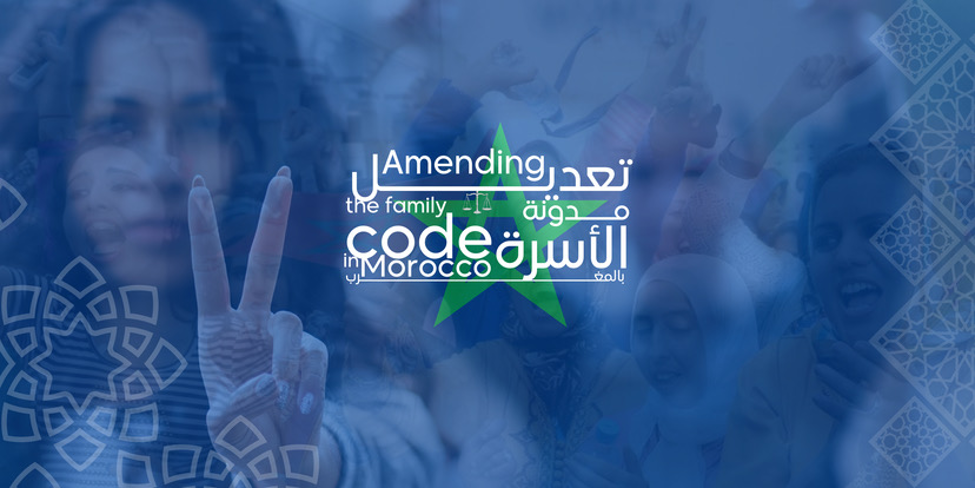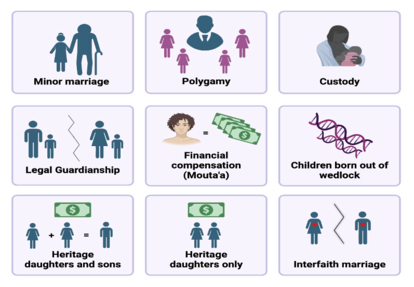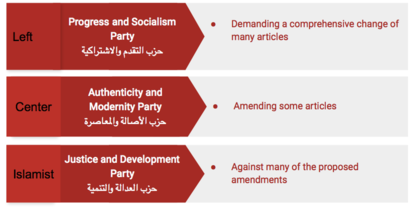Gender Equality
Gender Equality in the Bottleneck: What to Expect from the Changes to the Moroccan Family Code?

The Moroccan civil society is considerably active and efficient in the fields of education, human rights, and environmental policies, but activity and significant changes in the women’s rights sphere have been lagging behind and hindered due to societal constraints.
Due to the increasing demands for change, King Mohamed VI ordered the prime minister to revise the family code and the government to submit their proposals in six months. On the verge of amending Modwanat Al Osra, how the family code is called in Arabic, the question of what to expect from these amendments is raised in the ongoing discussion on women’s rights promotion.
Moudwanat Al Osra refers to the family code first adopted in 1965, amended in 2004, and built on the Islamic Sharia law. The Moudawana of 2004 replaced the one of 1965, which did not guarantee equal rights to women or sufficient protection. The current Moudawana consists of 400 articles, which determine fundamental women’s and children’s rights; nevertheless, the question or rather the confusion that is permanently attached to the discussion on Moudawana is: to what extent does the current Moudawana support women’s rights and does it promote sustainable change towards equality?
Many activists and politicians perceived the Moudawana of 2004 as revolutionary since it introduced vital changes to the inherited social dynamics and norms. However, the ever-evolving reality of Moroccan society is calling for more practical changes, and many provisions continue to deny women and children fundamental rights
Various women’s rights activists and associations protested against the inequality resulting from the current Moudawana, asking for revisiting the outdated articles. Accordingly, the king officially opened the door for discussions, established a committee, and asked it to submit proposals on amending the articles by 31 March 2024. The king stressed the importance of the principle of equality preserved in the 2011 constitution to become a reality. However, The king also stated, “I will not allow what Allah has forbidden.” Policymakers and the public have roughly interpreted this statement that no changes would be introduced in case of a contradiction to Sharia principles.
What Triggers the Demands to Amend the Moudawana?
The Moudawana regulates various fundamental areas such as marriage, divorce, child custody, etc.. One of the controversial articles in the Moudawana is the marriage of minors. Although the minimum marriage age was raised from 15 to 18 in 2004, article 20 of the code gives the family courts the authority to allow marriages of persons younger than the minimum age based on a “well-justified” marriage decision. Having this exception to the rule, in 2019, more than 30.000 requests for the marriage of minors were submitted to the family court, of which 82% were approved. According to Musawah reports, the justifications provided by the families marrying their daughters to the family judges mainly included saving the honor of the family or protecting their girls from any socially shamed activities like sex and drug consumption. More importantly, the judges give the approval most of the time based on their assessment of the physical appearance of the girls and how capable they are of handling “marital responsibilities”.
Interestingly, the Moudawana reform in 2004 also gave women the authority to conclude marriages; however, many prefer to delegate this authority to their male relatives. Similarly, polygamy is not prohibited by the current Moudwana. Women can include an article in the marriage contract that prevents polygamy. But many women do not use this right, as an analysis of marriage contracts reveals. This paradox raises a critical question:
What are the obstacles to reforming the Moudawana in a way that guarantees protection and equality for women? Could it be the societal norms and customs that hinder the development?
What can we expect from the Reforms to the new Moudawana?
Human rights activists demand for a radical change to the Moudawana to finally achieve equality for women. Nevertheless, if radical change is to be achieved, would the public be ready to accept it, or would society oppose it?
Before answering this question, it is essential to analyze how socially critical some of the articles under revision are and how intensely society reacts to the possibility of radically changing them. There are some controversial articles in the current Moudawana, where the Moroccan society is divided and where freedoms, religious principles, and societal norms intersect.

Concerning the marriage of minors, the proposed change is to fix a minimum age of 18 years and abolish the “assessment authority” the judges have to conclude marriages for girls younger than the legal age. Regardless of how significant and necessary this change is and how much it has to do directly with children’s protection/rights, many families oppose such change. Not only are the low-income families that might benefit financially from marrying their daughters opposing that, but surprisingly, as explained by the women’s rights activist Dr. Fardia Bennani during an interview with her, even many female intellectuals and politicians are against amending this article. Since the financial aspect is not necessarily a key factor for the later class, their opposition probably stems from the inherited social construct that girls and their honor are best protected by marriage. Dr. Bennani expects this article to change to the proposed draft, where judges can no longer conclude marriages of minors. With the absence of an explicit contradiction between this proposed change and Sharia, the possibility of passing this amendment is relatively high.
Polygamy is another paradoxical story. There are several calls to abolish polygamy, which conservative and Islamic parties vividly oppose. Similar to the case of the marriage of minors, even many women believe that the right to marry several women should not be abolished. Additionally, other women do not use the right granted to them by the 2004 Moudwana to include the condition of not marrying another woman in the marriage contract. Based on this social observation and the king’s statement, Dr. Bennani and Karima Rhanem, president of the Moroccan NGO International Center of Diplomacy, believe polygamy is unlikely to be abolished, at least in the near future.
Positively, custody and legal guardianship are expected to be amended in favor of women. In the current Moudawana, in case of divorce, the father immediately gets the right to custody of the kids if the mother decides to get re-married. Meanwhile, for legal guardianship, the fathers enjoy absolute authority over the financial and administrative affairs of the child. The opposition of society to a change in these articles is not as strong as it is for the other controversial articles; thus, Dr. Bennani and Karima Rhanem believe that there is a good possibility for a positive change.
“Compensation for enjoyment” or Mouta’a is a term that is perceived as highly problematic for many Moroccans since it implies that men financially compensate women after divorce for the time they enjoyed having sex with them. This provision is significantly downgrading and objectifying women. The alternative suggested for this term is “support money or financial compensation.”
Heritage is one of the most controversial issues, not only in Morocco, but in most Arabic-speaking countries, and one of the most challenging rules to change or amend since inheritance laws are stated verbatim in the Koran. Male heirs get double the share of female heirs, and if a family has daughters only, then the rest of the father’s family members have a share in this inheritance. There have always been attempts to overcome these rules; however, a significant segment of society is challenging those endeavors. The same goes for children born out of wedlock, who are stigmatized and denied basic citizen’s rights for life and the impossibility of interfaith marriages. Any reform of these principles is perceived as explicitly challenging religious principles and societal norms.
Regarding societal reaction, the political arena is divided into three main camps: the right, the center, and the left. Each has a position on the change of the Moudawana that reflects the disparities within the society. The following diagram shows three parties from the three camps and their different positions[1].
[1] https://kifache.com/%D8%A5%D8%B5%D9%84%D8%A7%D8%AD-%D9%85%D8%AF%D9%88%D9%86%D8%A9-%D8%A7%D9%84%D8%A3%D8%B3%D8%B1%D8%A9-%D8%A7%D9%84%D8%A7%D8%AA%D8%AD%D8%A7%D8%AF-%D8%A7%D9%84%D8%A7%D8%B4%D8%AA%D8%B1%D8%A7%D9%83%D9%8A/

Back to the main question raised by this article: Do societal norms and traditions stand in the way of reforming the Moudawana so that gender equality and protection for women’s rights are finally and fully guaranteed?
The short answer is yes.
Many people are convinced that the king’s call to change the Moudawana within Sharia’s framework indicates that the controversial articles will hardly be changed. Well, indeed, some of the proposed changes might contradict his statement. However, if we take a closer look at the proposed recommendations of the political parties on the articles, along with society’s reaction to these changes, we will find out that a good percentage of the population opposes fundamental changes. Awareness is a vital prerequisite for development and overarching changes. Changes can be forced from above by the authority of politicians, but they will not necessarily be accepted. What transforms changes to the law into sustainable development is the people’s power and willingness to bring about change.
In fact, the possibility of introducing critical changes to these nine articles on the one hand and the societal opposition to the proposed changes on the other is quite alarming. Indeed, there is no change without a counterforce anywhere in the world, but when women hesitate to use their rights and voice their demands, we need to revisit the current approach to change.
One might argue that the impact of traditions and customs is stronger than the laws. When changes were forced in 2004 in Moudawana, people opposed it initially but gradually accepted it. Sometimes, changes need to be forced.
At first glance, it can be concluded that the current Moudwana introduced many positive changes, but can we claim that it reconciled society and its complexities? Or do the strong waves of opposition to the current amendments prove otherwise?
If the speculations presented in this article reflect more or less the outcome of the current reform, it can be argued that Morocco will be a leading country in the women’s rights field within the Arab-speaking world. However, the complexities of Moroccan society, its Islamic identity, and the hesitation of its leaders to push for serious reform may also result in a half-hearted reform, which would be unsatisfying from a human rights point of view and a missed opportunity for the MENA region.
